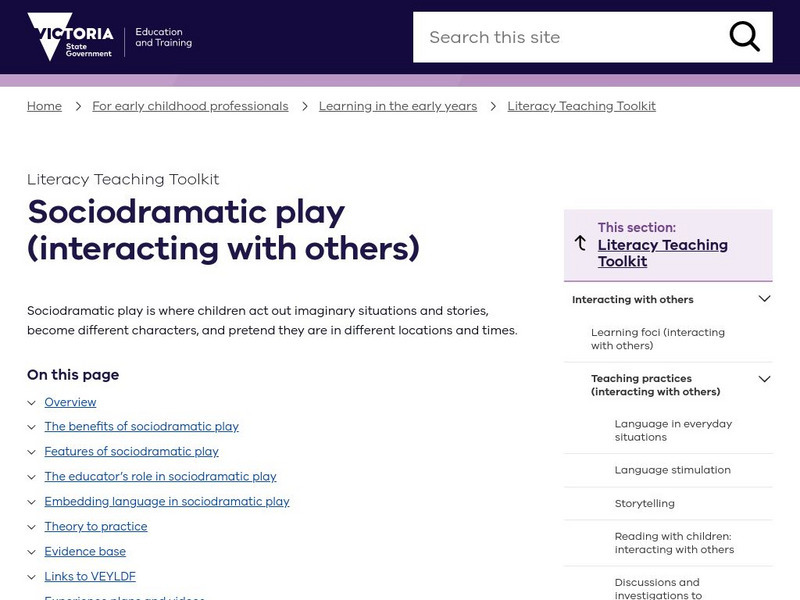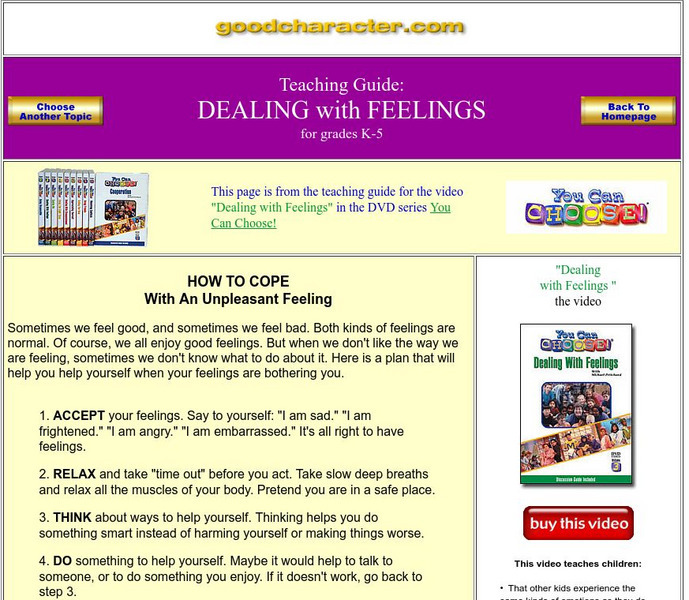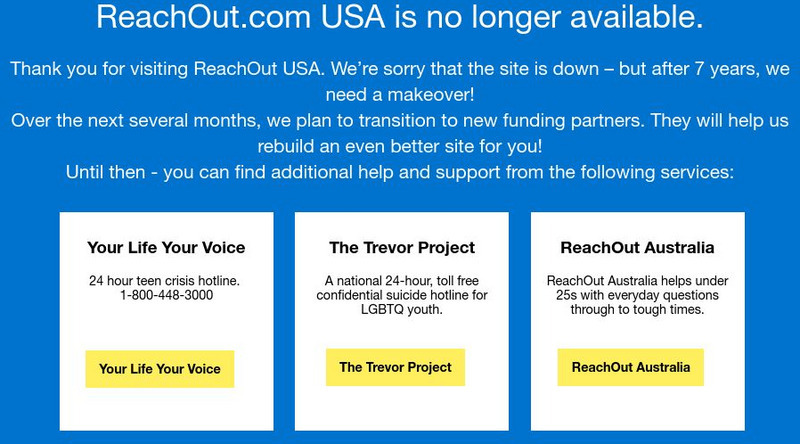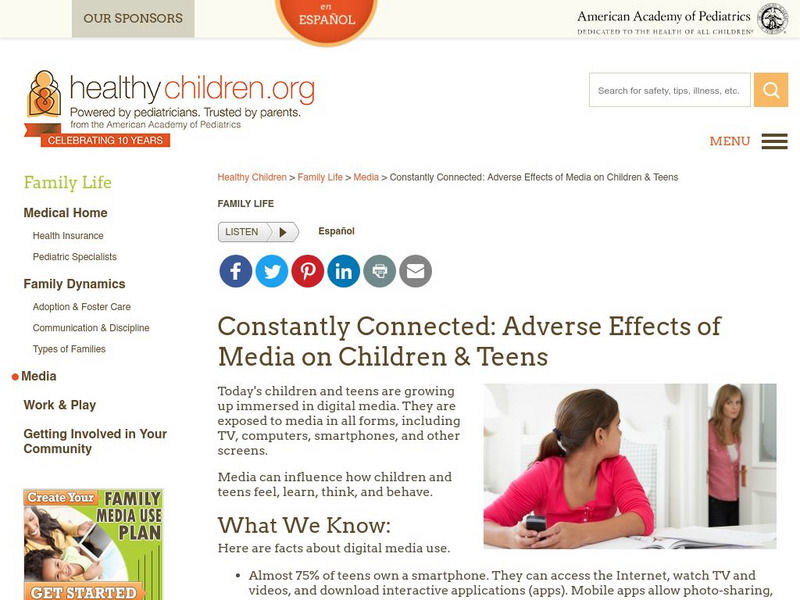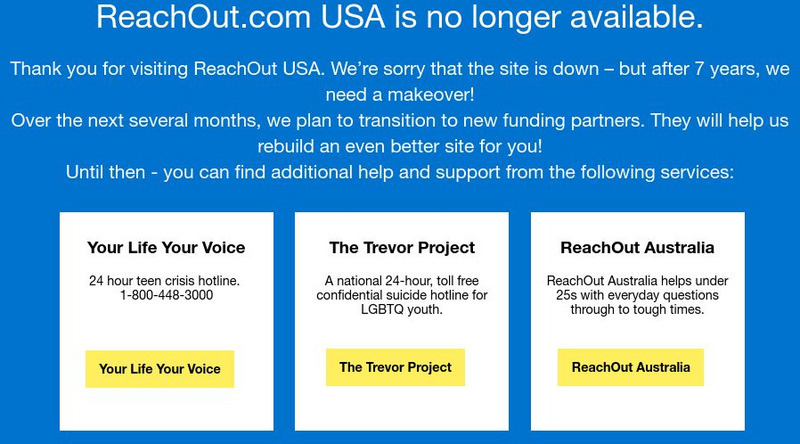PBS
Pbs Learning Media: Sesame Street: Veterans
In every adventure, some things change, but others stay the same. Use this page as a way to talk about the things that are the same, things that are different, and things that you'd like to keep the same, perhaps family traditions or...
PBS
Pbs Learning Media: Daniel Tiger's Neighborhood: Article: Helping Children Feel Valued and Loved
In this article, see how Daniel Tiger's Neighborhood continues the longstanding tradition of sharing an important message to children: "You are special."
Other
Victoria State Government: Sociodramatic Play (Interacting With Others)
Sociodramatic play is where children act out imaginary situations and stories, become different characters, and pretend they are in different locations and times. Sociodramatic play is the most advanced form of play, and constantly...
PBS
Pbs Learning Media: Back to School: Activity Starters: Xavier Riddle and the Secret Museum
Be deliberate when inviting your student to watch a PBS KIDS show. These resources can help by adding meaningful conversation and easy activities to their experience watching Xavier Riddle and the Secret Museum.
PBS
Pbs Learning Media: Summer Camp: Fill Each Day With Possibilities! Play Your Way! Calendar
The summer is full of possibilities and so is your child. Use this calendar to choose activities, games, and videos to enjoy.
PBS
Pbs Learning Media: Summer Camp: Fill Each Day With Possibilities! Making Family Traditions Packet: Pre K and K
Use these family traditions-themed activity sheets to allow children to choose their own learning adventures.
Other
Teenage Growth and Development: 11 14
During the ages of 11 to 14, children begin a sequence of changes that produces significant emotional and physical changes. This article outlines some of those changes and how parents can support these developments.
Live Wire Media
Good Character: Dealing With Feelings
Learn how to cope with unpleasant feelings, and to teach young learners how to deal with their emotions.
ReachOut USA
Reach Out Usa: Communicating About Grief With Your Family and Friends
ReachOut fact sheets are written by young people for young people and edited by a mental health professional. This page offers suggestions for how to talk about a recent death with family and friends.
ReachOut USA
Reach Out Usa: Trust Issues
ReachOut fact sheets are written by young people for young people and edited by a mental health professional. This page discusses the importance of trust, how it can be difficult to trust others, rebuilding trust, and how to learn to...
Other
Aap: Constantly Connected: Adverse Effects of Media on Children & Teens
This article shares information about the adverse effects of the media on children's health.
ReachOut USA
Reach Out Usa: Friendships and Peer Relationships
ReachOut fact sheets are written by young people for young people and edited by a mental health professional. This page has tips for how to deal with friendship issues, bullying, and peer pressure.
ReachOut USA
Reach Out Usa: Gratitude, Forgiveness and Happiness
ReachOut fact sheets are written by young people for young people and edited by a mental health professional. This page discusses how practicing gratitude and forgiveness can help one be happier.
ReachOut USA
Reach Out Usa: Managing Expectations
ReachOut fact sheets are written by young people for young people and edited by a mental health professional. This page has tips for understanding what expectations are and how to deal with them.
ReachOut USA
Reach Out Usa: Having Difficult Conversations
ReachOut fact sheets are written by young people for young people and edited by a mental health professional. This page offers tips for how to handle sharing difficult news with someone.
ReachOut USA
Reach Out Usa: More Tips for Communicating Effectively
ReachOut fact sheets are written by young people for young people and edited by a mental health professional. This page offers seven tips for communicating well with others.
ReachOut USA
Reach Out Usa: Fighting With Your Sibling
ReachOut fact sheets are written by young people for young people and edited by a mental health professional. This page discusses why siblings may not get along and offers suggestions for handling conflict with a sibling.
ReachOut USA
Reach Out Usa: How Can I Develop Coping Strategies?
ReachOut fact sheets are written by young people for young people and edited by a mental health professional. This page has tips for how to cope with challenging situations and events.
ReachOut USA
Reach Out Usa: Resolving an Argument or Disagreement
ReachOut fact sheets are written by young people for young people and edited by a mental health professional. This page has tips for how to handle a disagreement.
ReachOut USA
Reach Out Usa: When Parents Are Fighting: Dealing With a Breakup or Divorce
ReachOut fact sheets are written by young people for young people and edited by a mental health professional. This page has tips for how to handle your parents splitting up or divorcing, and what to expect.
ReachOut USA
Reach Out Usa: Arguing With Your Parents or Guardians
ReachOut fact sheets are written by young people for young people and edited by a mental health professional. This page has tips for understanding conflict with parents or guardians and how to communicate with them.
Other
Elementary School Counseling: Identifying and Expressing Feelings
This site contains a collection of activities to teach students how to identify and express their feelings.
CommonLit
Common Lit: Themes: Beauty & Happiness: How Can We Achieve Happiness?
This is a collection of Grade-Leveled texts (3-12) to address the question, "How can we achieve happiness?" Select a grade level and a collection of on grade-level reading passages on the topic comes up. [Free account registration...
American Museum of Natural History
American Museum of Natural History: Ology: Express Yourself
Test your skill at reading the emotion expressed in a face in these two matching games.



